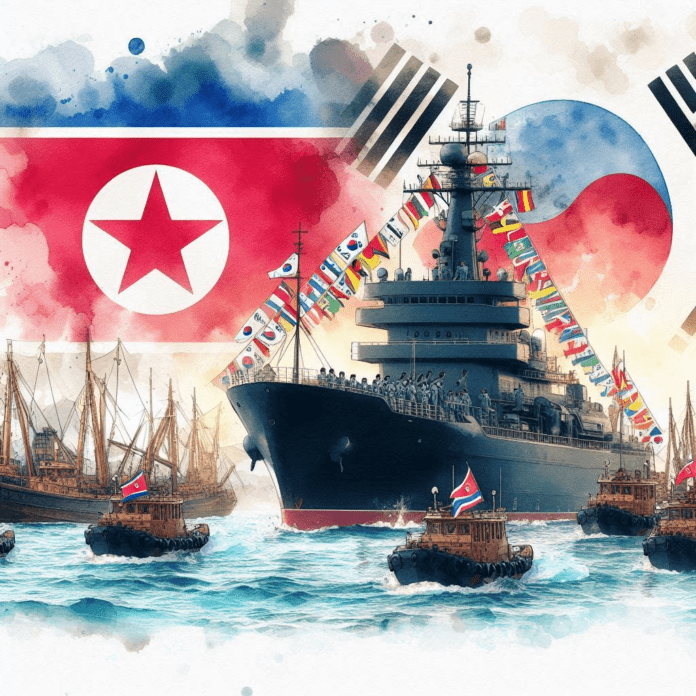In a significant enforcement action, South Korean authorities seized a 5,000-ton cargo ship on Thursday on suspicion of violating United Nations Security Council sanctions against North Korea. The freighter, whose origin remains unknown, is currently anchored at the Port of Busan on South Korea’s southeastern coast. The exact nature of the ship’s violations is not yet clear, raising concerns about ongoing efforts to evade international sanctions imposed on North Korea.
This seizure comes on the heels of a similar incident in late March when South Korean authorities intercepted a 3,000-ton cargo ship named DEYI. The DEYI was en route to Vladivostok, Russia, when it was seized in waters off Yeosu, along South Korea’s southern coast, also under suspicion of violating UN Security Council sanctions. The DEYI is now anchored at Busan Port, with the captain and crew remaining on board as investigations continue.
Background on U.N. Security Council Sanctions Against North Korea
The United Nations Security Council Sanctions is a series of stringent sanctions on North Korea in response to its nuclear weapons program and ballistic missile tests. UN Security Council sanctions aim to curb North Korea’s ability to develop and finance its weapons programs, thereby promoting regional and global security. Key measures include restrictions on the import and export of certain goods, a ban on the transfer of luxury items, and limitations on financial transactions and asset freezes targeting specific individuals and entities associated with the North Korean regime.
The Role of Maritime Interdiction in Enforcing Sanctions
Maritime interdiction is a critical component of enforcing UNSC sanctions against North Korea. Ships suspected of violating these sanctions, whether by transporting prohibited goods, engaging in illicit ship-to-ship transfers, or facilitating the smuggling of sanctioned materials, are subject to inspection, detention, and potential seizure by member states.
The recent seizures by South Korea highlight the ongoing challenges in monitoring and intercepting maritime activities that may undermine the effectiveness of international sanctions.
The Seizure of the 5,000-Ton Cargo Ship
The recent seizure of the 5,000-ton cargo ship at the Port of Busan underscores the vigilance of South Korean authorities in upholding UN Security Council sanctions. While the ship’s origin and specific violations are still under investigation, its detention signals a proactive stance in preventing potential breaches of international law. The anchoring of the ship at Busan Port allows for a thorough inspection and investigation by South Korean authorities, who will seek to determine the nature of the suspected violations and any links to North Korean activities.
The Case of the DEYI Cargo Ship
The earlier seizure of the DEYI cargo ship further illustrates the complexities of enforcing maritime sanctions. The DEYI, a 3,000-ton vessel, was intercepted while heading to Vladivostok, Russia. Its seizure in waters off Yeosu, South Korea, suggests that it may have been involved in activities that violated UN Security Council sanctions, such as the transport of prohibited goods or engagement in illicit trade.
The continued presence of the DEYI at Busan Port, with the crew and captain onboard, indicates an ongoing investigation to ascertain the full extent of its suspected violations.
Cracking Down on Houthi Oil: U.S. Imposes Fresh Sanctions on Indian, Hong Kong Based Facilitators
Implications for Regional Security
The seizure of these ships has significant implications for regional security and the effectiveness of international sanctions against North Korea. By intercepting vessels suspected of violating sanctions, South Korea sends a clear message about its commitment to enforcing UNSC measures and preventing the proliferation of illicit activities that could support North Korea’s weapons programs. These actions also serve as a deterrent to other potential violators, emphasizing the risks and consequences of engaging in prohibited activities.
Crisis Escalates: South Korea Sanctions 2 Russian Vessels and 7 North Korean Individuals
The Global Effort to Curb North Korea’s Illicit Activities
The enforcement of UN Security Council sanctions against North Korea is a global effort that requires cooperation and coordination among member states. Maritime interdiction plays a crucial role in this collective endeavor, as ships are often used to transport goods and materials that could be used to support North Korea’s nuclear and missile programs. By seizing vessels and conducting thorough investigations, member states like South Korea contribute to the broader goal of ensuring compliance with international sanctions and promoting global security.
Challenges in Enforcing Maritime Sanctions
Despite the concerted efforts of the international community, enforcing maritime sanctions against North Korea presents numerous challenges. Ships suspected of violating sanctions may employ deceptive practices, such as falsifying documents, using flags of convenience, or engaging in ship-to-ship transfers to evade detection. The vast expanse of the world’s oceans and the complex nature of global maritime trade further complicate efforts to monitor and intercept illicit activities.
Steering Through Danger: The Impact of AIS Deception on Maritime Safety
The Importance of Continued Vigilance
The recent seizures by South Korean authorities highlight the importance of continued vigilance and robust enforcement measures to uphold UN Security Council sanctions against North Korea. Effective maritime interdiction requires the dedication and resources of member states, as well as cooperation with international partners and organizations. By maintaining a watchful eye on maritime activities and taking decisive action against suspected violators, the international community can strengthen the enforcement of sanctions and contribute to regional and global security.
Maritime Mystery Unfolds: German Prosecutors Probe Ship for Sanctions Breach
The seizure of the 5,000-ton cargo ship and the earlier interception of the DEYI cargo ship by South Korean authorities underscore the ongoing challenges and importance of enforcing UN Security Council sanctions against North Korea. These actions demonstrate South Korea’s commitment to preventing the proliferation of illicit activities that could support North Korea’s weapons programs and undermine international security.
As investigations continue, the international community must remain vigilant and cooperative in its efforts to uphold sanctions and promote a safer, more secure world.


